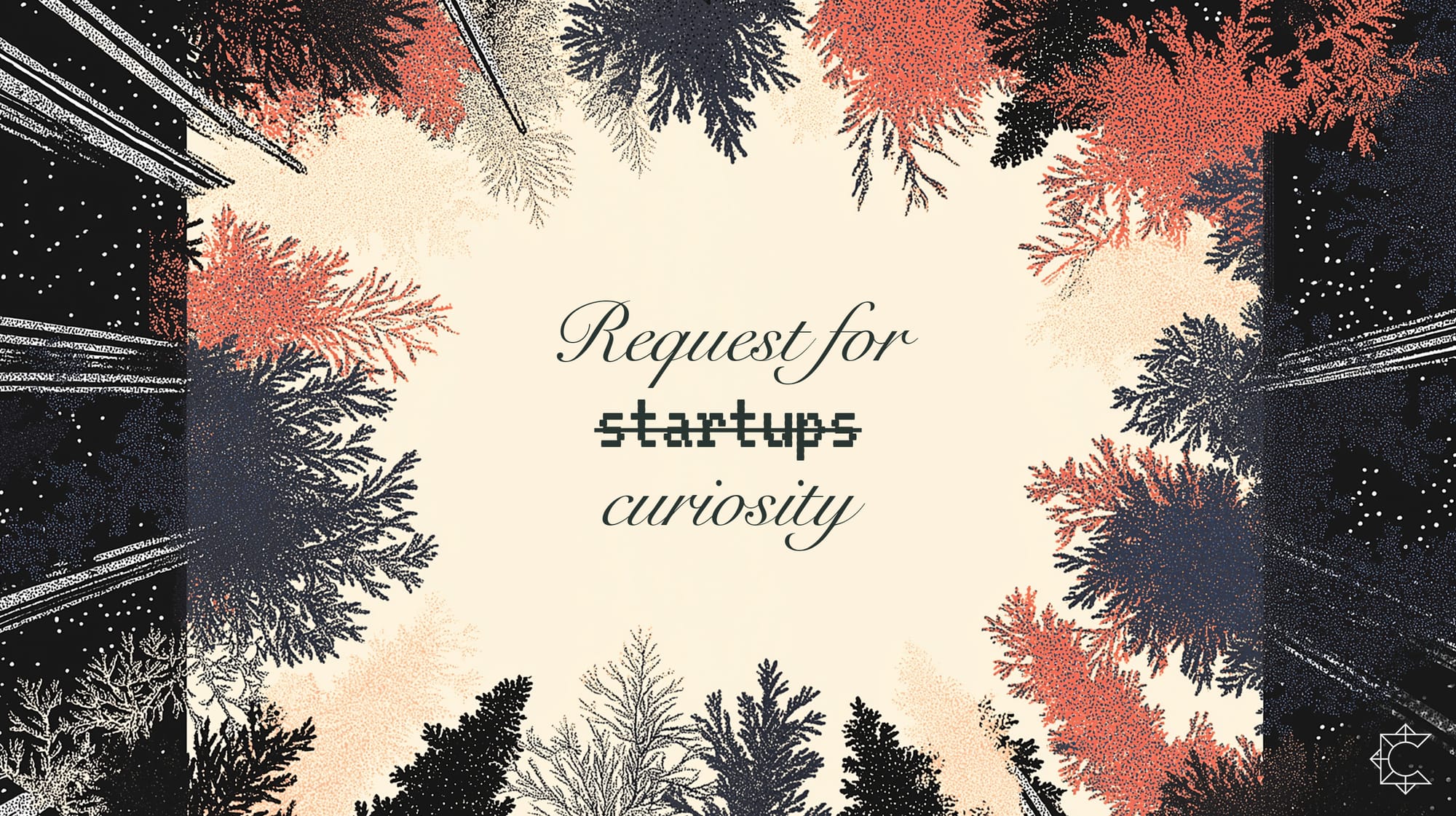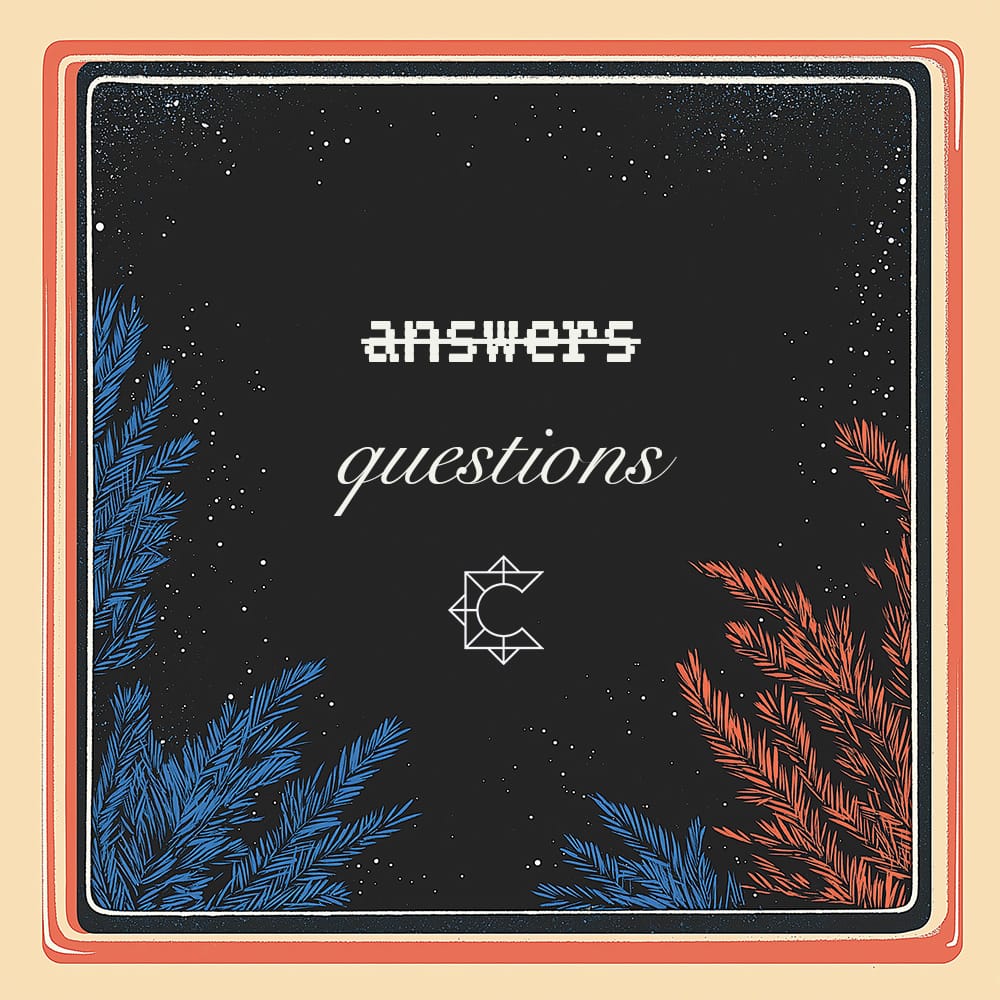SPC's Request for Curiosity, Part 2
Questions SPC members are exploring at the end of 2024

Our first Request for Curiosity shared what the SPC team is puzzling over right now. Our second request comes straight from SPC members.
SPC is a community for -1 to 0, when your task is to figure out what's next. This stage is itself a question, and our experience shows us that the people who navigate it best are the most curious. We don’t expect the founders, technologists, and researchers who join SPC to have all the answers. We expect our members to help each other explore compelling unknowns.
This isn't a request for startups, but a request for curiosity. Below are some of the questions our members are exploring right now. If you are exploring similar domains, or interesting questions we haven't yet thought to ask, join us.

If LLMs aren't the path to AGI, what is?
There's a clear divide amongst deep learning researchers and neuroscientists around what defines a sufficiently intelligent model. While existing ANN-based architectures are extremely useful, it's debatable whether they possess the potential for general agentic behavior. Why has there been relatively little talent/capital investment in neuroscience-inspired AI research like reservoir computing and neuromorphic chips?
- What alternative training methods can be devised for non-differentiable models, given their significant training challenges?
- Given the similar constraints generalist robotics models have as LLMs (huge data requirements for weak in-sample learning), could we recreate slices of neurology for small-scoped use cases like motor control?
- Could the DeepMind/OpenAI model of funding research through commercial applications work for neuroAI?
Reach out to: Bryan Houlton
What does the human-machine relationship look like when people grow up with the same agents?
The next generation will likely grow up using the same hardware and software OS from childhood (introduced by their already-locked-in parents), with an account generating huge amounts of data from birth that an agent can access. Nearly every purchase, moment, schedule, and thought will be linked through accounts and devices.
- What does a human-machine relationship look like (not to mention the human-company relationship) when rapidly improving AI “grows up” with you?
- Are the personal context capabilities so beneficial they lock people into a specific company or agent?
- What happens to this relationship and data when someone dies?
- Could it effectively become like you, nearing a digital consciousness?
Reach out to: Ashton Eaton
Will AI be able to capture services revenue from highly vertical and niche businesses?
AI has already unlocked the "10x" engineer/marketer/sales employee. It's only a matter of time before AI does the same for smaller, harder-to-automate industries with massive services TAM.
- How will these companies align incentives to capture the broader services TAM?
- What existing tech company patterns can be applied to niche audiences?
- Will we see horizontalization across many verticals (like ChatGPT)? Or will highly verticalized and unique products pop up, especially as code becomes easier to write?
Reach out to: Shruti Merchant, Jon Tippens
What is the new business model for social networking?
Social media was stagnant until suddenly it wasn't: TikTok challenged Meta, Elon bought Twitter, and decentralized networks like the fediverse and Bluesky emerged. Yet business models remain unclear, especially for decentralized networks where ads are harder to implement and some communities are actively hostile to monetization. None of the alternative models like commerce (TikTok), subscriptions (YouTube), creator patronage (Discord, Twitch, Patreon), donations (fediverse), and user-to-user micropayments (Nostr, Farcaster) have won.
- What’s the size of the market? How do we measure it?
- Are ads at all feasible or practical in decentralized contexts? If so, how?
- Are subscriptions feasible or practical? Would a critical mass of users pay for a social network?
- Does cryptocurrency net help or hurt here?
Reach out to: Ryan Barrett
Email is here to stay...so how will AI revolutionize it?
It’s clear: Email will never die. The format's brutalist simplicity offers unique opportunities as an interface. What happens when AI can parse through decades of personal context locked in our inboxes?
- What deeper effects emerge when AI uses email as a base communication layer for social experiences?
- What new consumer experiences can arise from combining email's low friction with AI's capabilities?
- Could personal email context enable more nuanced AI interactions?
Reach out to: Jonathan Wegener
Will the structure of System-2 be implicit or explicit?
Current approaches to building Artificial "System 2" apply data structure interfaces to LLMs—vector databases (hash maps), time partitions (trees), and knowledge graphs provide rails for grounding reasoning and low-level action space for memory and planning.
- Will we see convergence toward explicit encoding, or will AGI lean on implicit structures?
- Will action space graphs and knowledge graphs need to be explicitly built for System-2, or will they build themselves implicitly?
- System 2 creative tasks seem to have different requirements from System 2 exploitation tasks. How do an overall system's goals affect agentic subsystem design choices?
- Is there an analogy in System 2 design for filtering noise from System 1, and what does it look like?
Reach out to: Sam Liu
What might AI-native incentive mechanisms for new data generation look like in the LLM era?
Current LLMs rely on knowledge created through advertising flywheels, community contributions, and paid content. As AI becomes a critical production tool and humans generate less of the data used to create LLMs, we will need new ways to encourage "net new" information.
- Will entirely new incentive mechanisms emerge, or will existing ones adapt?
- Could prompts evolve into a form of monetizable intellectual property?
- What gaps in data or content are most pressing? What types of “net new” knowledge or data creation should take priority
- What systems could align incentives for creating original knowledge rather than recycling data?
Reach out to: Jaggie Zhu
What company will be the next Craigslist / WhatsApp?
WhatsApp had 55 people serving 450 million users growing by 1 million a day when the company was acquired. Craigslist generated $1 billion revenue with ~50 people in 2019. AI creates unprecedented leverage, but we haven't yet seen a company apply that leverage internally to achieve massive impact with a tiny team.
- How can AI agents replace core functions like customer support and data engineering?
- Can fractional or part-time operators unlock value for a company and leave behind knowledge to be leveraged by FTEs?
- What infrastructure lets work become a vendor payment rather than personnel?
- How might distribution advantages replace large go-to-market teams?
Reach out to: Sanjay Saraf
Will AI disrupt big tech's advertising monopoly?
Adtech has long been "intelligent," with algorithmic ad bidding and targeting controlled by big tech ad sellers. Advertisers accept this black box, even when it obscures misaligned incentives, because they believe in big tech's superior technical capabilities and proprietary data. With AI advances, this dynamic might shift.
- Could advertisers build their own intelligence with minimal technical expertise? Are advertisers frustrated enough with the black box to try?
- Will first-party data and custom AI outperform current options, especially as privacy regulations erode tracking?
- What lessons from market making in stock trading could improve ad market efficiency?
- What balance of control versus automation is ideal for different segments of advertisers? What new product formats might emerge for each?
Reach out to: Yurong Fan
How will learning and teaching transform in the post-AGI era?
The looming advent of AGI opens the possibility of flipping the classroom dynamic, with AI taking a central role in personalized education. AI systems could address scarcity of skilled educators and rigid one-size-fits-all learning, while human teachers focus on motivation, mentorship, and fostering curiosity.
- How can AI efficiently assess and adapt to a learner's skill level across subjects while encouraging genuine learning?
- How can AI act as a "nudger," sparking curiosity and guiding learners toward new areas of knowledge?
- What frameworks enable AI and human teachers to co-create enriching experiences beyond digital screens?
- How can we ensure inclusivity in an AI-driven education system, particularly for learners without access to advanced technology or reliable internet?
- What are the implications for lifelong learning beyond childhood?
Reach out to: Gaurav Bhalotia
How will agents transform knowledge creation and human-computer interfaces?
Today, knowledge creation is limited by the speed of human data processing and static graphic user interfaces. As humans delegate more to agents, our interaction patterns will fundamentally change.
- What interfaces emerge when optimizing for supervision and context sharing rather than structured inputs?
- Will conversational interfaces dominate, or will other modalities like eye tracking and gesture detection integrate into daily computing?
- How will human-to-human interactions change when computers can interpret and mimic language and physical cues?
Reach out to: Anaid Chacón
How might governments harness AI to scaffold the workflows of public servants?
People complain about public sector inefficiency, but many are critical public sector jobs require human-to-human interface. Instead of just automating processes, are there opportunities to build co-pilots that deepen productivity and cut administrative overhead?
- Can we empower government supervisors to build tooling for their workers?
- What additional safety guardrails are needed for products deployed with frontline government workers?
- Can co-pilots for government workers speed the adoption of best practices and new knowledge from the private sector?
Reach out to: Temina Madon
What kinds of search engines can we build with way more compute?
LLMs excel at understanding content and recommendation systems quickly learn user preferences. Yet Google and Perplexity still optimize for speed and cost. What becomes possible when you scale compute 1000x and searches cost $10?
- How can you analyze millions of search results with LLM-level intelligence?
- How can you combine recommendation system preference modeling with LLMs?
- Which problems justify spending 100x more per search?
Reach out to: Jacob Peddicord
How will content be consumed by humans in the future?
The rate of content creation is growing and will be supercharged by AI-generation. It is already overwhelming to consume content and “stay on top things.” Content consumption also feels very out of the user’s control—the algorithm decides what you see.
- What does goal-driven focused content consumption look like?
- How do you control your own algorithm?
- How will content quality be determined in the future?
Who to talk to: Priya Shah
If we successfully outsource intelligence to AI, how can technology help us be more human?
As AI replaces economically valuable tasks performed by humans, value will shift toward other aspects of the human experience—the emotional, artistic, communal, and embodied experiences of being human. Cultural trends already reflect this shift, prioritizing analog, IRL, manual, and unstructured experiences.
- Can AI amplify the parts of human experience that don't center intelligence?
- How can AI enhance human relationships and build community rather than replace them?
- How can AI unlock 10x more emotionally impactful experiences?
Reach out to: Jon Chan
What happens to us when we die?
It’s trendy to think that we can prolong human lifespan indefinitely, but so far the evidence says otherwise. Assuming lengthening median lifespans and ever-rising healthcare costs, there’s enormous pain ahead and huge opportunities to address it.
- How do we reduce long-term care costs using technology?
- Can we combat the loneliness that often precipitates mental decline?
- The first generation of digital natives are retiring right now. What do they need in order to stay independent and empowered for as long as possible?
- Very few people plan for something that’s (currently) inevitable. How do we reduce the strain on families by creating better onramps for end-of-life planning?
Reach out to: Aaron Gotwalt
If you're exploring any of these questions, feel free to reach out to the SPC member listed—or, better yet, apply to SPC for membership.
